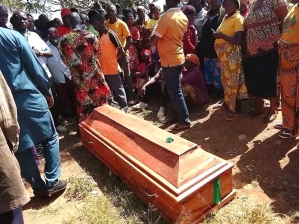
Fulani assailants and other terrorists in Nigeria killed nine Christians in Plateau state and a pastor in Kaduna state in the past week, sources said.
In the Kauru area of Kaduna state, Fulani assailants on Oct. 28 killed the Rev. Yahaya Kambasaya and kidnapped 20 of his church members in an attack on predominantly Christian Farin Dutse village, said Dan Gwamna of the pastor’s United Church of Christ in Nigeria (UCCN, also known as HEKAN) congregation.
“The incident occurred in the early hours of Tuesday, Oct. 28 – the Muslim Fulani bandits who were armed with deadly weapons invaded Farin Dutse village, a Christian community, shooting its residents and burning down their houses,” Gwamna said in a message.
Pastor Kambasaya was serving under the denomination’s Kauru District Church Council. HEKAN leaders confirmed the killing of the pastor and the abduction of 20 members of the church. The Rev. Amos Kiri, president of HEKAN, in a press statement described the attack as “callous, inhumane and wicked.”
Pastor Kiri said Muslim Fulani militants and terrorists have been targeting Christian communities and pastors in northwest Nigeria.
“The bandits invaded the community and started shooting sporadically,” Pastor Kiri said. “Rev. Kambasaya and a few others took refuge in a nearby farm. Thinking the gunmen had left, he came out of hiding, only to be shot in the back. The bullet pierced through his chest, and he died instantly.”
Gwamna requested prayer for the church.
“Pray for HEKAN (UCCN) church members, especially for members in the Kauru District Church Council, over the killing of our pastor, Rev. Yahaya Kambasaya, and the abduction of 20 of our church members,” he said. “Pray for the release of the captives.”
Plateau State Attacks
In neighboring Plateau state, “bandits and terrorist elements” on Monday (Nov. 3) killed one Christian, 28-year-old Joseph Dauda Mwanti, and wounded another, Joshua Mwanvwang, 33, in Wereng village, said Dalyop Solomon Mwantiri, a Christian attorney from the area.
“We are again in tears over acts of terrorism meted out on Wereng community of Riyom LGA at about 9 p.m. of 3rd November by bandits and terrorist elements operating from Fass settlement of Jol community,” Mwantiri said in a statement. “These incidents occurred even when they were preceded with early warning alert given to relevant authorities.”
Council Chairman of Riyom Local Government Area Sati Bature Shuwa described the attack as “heartbreaking and unacceptable.”
“We will not relent in our constitutional duty to safeguard the lives and property of all citizens, as the pride of this administration lies in the wellbeing and safety of its people,” Shuwa said in a statement.
Chris Giwa, a diplomat and leader from the area, also cited early warnings to officials.
“I am outraged and disheartened by the attack on the Wereng community in Riyom LGA, which resulted in one death and two injuries,” Giwa said. “This heinous act occurred despite an early warning about the community’s vulnerability to such attacks. It’s particularly disheartening that this incident comes just a week after I visited Wereng, commiserated with the community and encouraged them to stand firm against marauders seeking to displace them and seize their lands.”
Giwa called for a comprehensive overhaul of the security apparatus to address coordinated attacks on Plateau’s people.
In predominantly Christian Kwi village a few miles from Wereng, “armed Fulani militas” on Friday and Saturday (Oct. 31-Nov. 1) killed eight Christians, said community leader Rwang Tengwon.
“Kwi community was attacked on Friday, Oct. 31, by armed Fulani militias,” Tengwon said. “Seven Christians were killed that Friday, while one other Christian was also killed on his farm on Saturday, Nov. 1.”
Numbering in the millions across Nigeria and the Sahel, predominantly Muslim Fulani comprise hundreds of clans of many different lineages who do not hold extremist views, but some Fulani do adhere to radical Islamist ideology, the United Kingdom’s All-Party Parliamentary Group for International Freedom or Belief (APPG) noted in a 2020 report.
“They adopt a comparable strategy to Boko Haram and ISWAP and demonstrate a clear intent to target Christians and potent symbols of Christian identity,” the APPG report states.
Christian leaders in Nigeria have said they believe herdsmen attacks on Christian communities in Nigeria’s Middle Belt are inspired by their desire to forcefully take over Christians’ lands and impose Islam as desertification has made it difficult for them to sustain their herds.
Nigeria remained among the most dangerous places on earth for Christians, according to Open Doors’ 2025 World Watch List of the countries where it is most difficult to be a Christian. Of the 4,476 Christians killed for their faith worldwide during the reporting period, 3,100 (69 percent) were in Nigeria, according to the WWL.
“The measure of anti-Christian violence in the country is already at the maximum possible under World Watch List methodology,” the report stated.
In the country’s North-Central zone, where Christians are more common than they are in the North-East and North-West, Islamic extremist Fulani militia attack farming communities, killing many hundreds, Christians above all, according to the report. Jihadist groups such as Boko Haram and the splinter group Islamic State in West Africa Province (ISWAP), among others, are also active in the country’s northern states, where federal government control is scant and Christians and their communities continue to be the targets of raids, sexual violence, and roadblock killings, according to the report. Abductions for ransom have increased considerably in recent years.
The violence has spread to southern states, and a new jihadist terror group, Lakurawa, has emerged in the northwest, armed with advanced weaponry and a radical Islamist agenda, the WWL noted. Lakurawa is affiliated with the expansionist Al-Qaeda insurgency Jama’a Nusrat ul-Islam wa al-Muslimin, or JNIM, originating in Mali.
Nigeria ranked seventh on the 2025 WWL list of the 50 countries where it is most difficult to be a Christian.






